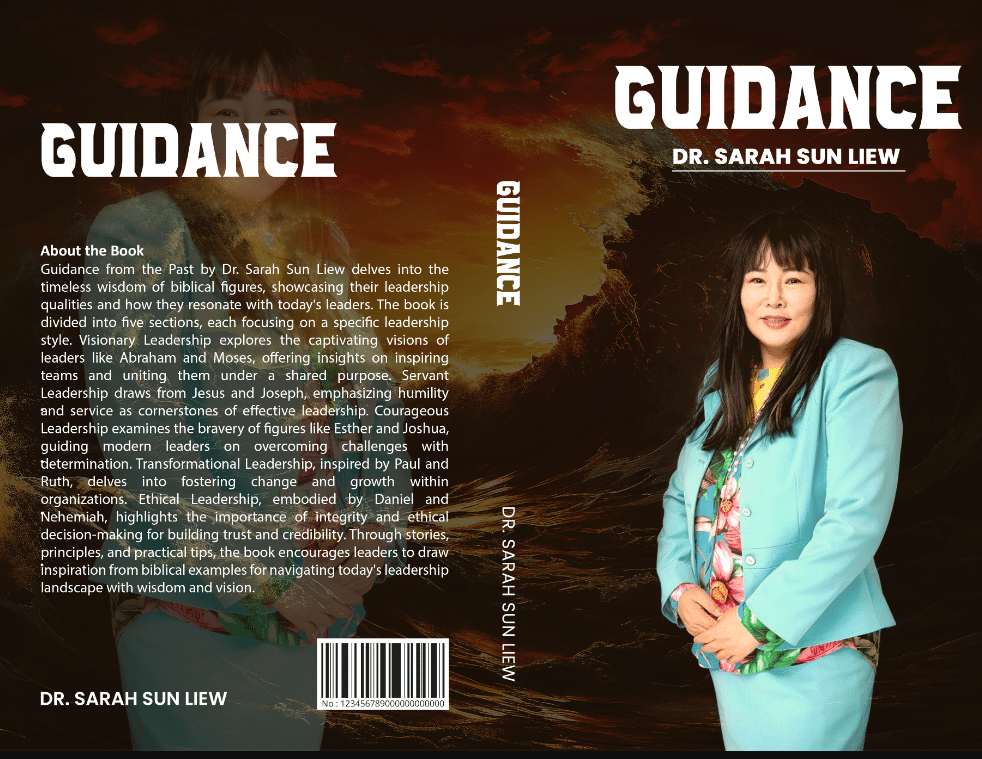“Guidance from the Past Vision for the Future: Biblical Leadership in Today’s World” by Dr. Sarah Sun Liew offers a unique perspective on leadership through the lives of prominent biblical figures. One of the compelling chapters is Chapter 2, “Leading with Integrity: Lessons from Abraham,” which delves into the life and leadership of Abraham, a foundational figure whose story offers timeless lessons in integrity, faith, and ethical decision-making.

Photo Courtesy: Meridian Beverly Hills Investment and Legal Group
Abraham: A Paragon of Integrity
Abraham, known as the “father of faith,” is a central figure in many religious traditions, revered for his unyielding commitment to God’s call and his unwavering integrity in all aspects of his life. This chapter explores how Abraham’s leadership journey serves as a powerful model for contemporary leaders who must navigate complex ethical landscapes while staying true to their values.
The chapter begins by introducing Abraham’s initial call from God to leave his homeland and journey to an unknown destination. This act of faith required immense courage and trust, setting the stage for his subsequent leadership challenges. Dr. Liew emphasizes that Abraham’s story is not merely about religious obedience but also about demonstrating integrity and ethical leadership in the face of uncertainty and adversity.
Key Lessons in Integrity and Ethical Leadership
One of the primary lessons from Abraham’s life is his unwavering commitment to integrity, even when faced with difficult circumstances. For instance, the chapter discusses Abraham’s interactions with Pharaoh and Abimelech, two leaders who unknowingly threatened his family. In both instances, Abraham made mistakes—introducing his wife, Sarah, as his sister to protect himself. However, when confronted, Abraham did not shy away from admitting his error and took responsibility for his actions.
This transparency and willingness to accept accountability illustrate the core of ethical leadership: the ability to own up to one’s mistakes and take corrective action. In a contemporary context, where leaders are often under public scrutiny, Abraham’s example underscores the importance of honesty, transparency, and integrity in maintaining trust and credibility.
Navigating Ethical Dilemmas: Abraham’s Approach
The chapter also highlights how Abraham navigated complex relationships and ethical dilemmas. For example, his interactions with his nephew Lot provide a masterclass in conflict resolution and ethical decision-making. When a dispute arose over grazing land, Abraham, instead of asserting his authority, offered Lot the first choice of land, demonstrating his preference for harmony and fairness over personal gain.
Dr. Liew uses this story to illustrate that ethical leadership often requires prioritizing relationships and the greater good over personal interests. Abraham’s decision to allow Lot to choose first reveals a leader who values collaboration and mutual respect, qualities that are crucial in today’s interconnected and diverse workplaces.
Faith and Risk-Taking in Leadership
Another significant aspect of Abraham’s leadership highlighted in the chapter is his ability to balance faith with calculated risk-taking. Abraham’s journey began with a divine call to leave his homeland, a decision that required stepping into the unknown with no guarantee of success. This decision exemplifies the delicate balance between faith and risk—a concept that is highly relevant to modern leadership.
Dr. Liew points out that Abraham’s faith was not blind; it was rooted in a profound trust in a greater vision. In today’s volatile business environment, leaders are often required to make strategic decisions amid uncertainty. Abraham’s story encourages leaders to take bold steps and embrace uncertainty while remaining grounded in their core values and purpose.
Relevance for Contemporary Leaders
Chapter 2 of “Guidance from the Past Vision for the Future” is particularly significant for contemporary leaders who face a myriad of challenges in a complex and rapidly changing world. Abraham’s story offers several key takeaways:
- Integrity is Non-Negotiable: In an era where leaders are constantly under scrutiny, maintaining integrity is crucial for building trust and credibility. Abraham’s story reinforces that leaders should prioritize honesty and transparency, even when it is inconvenient.
- Embrace Ethical Decision-Making: The chapter encourages leaders to consider the long-term impact of their decisions on their organizations and communities. By focusing on the greater good and upholding ethical standards, leaders can build sustainable and resilient organizations.
- Balancing Risk and Faith: Abraham’s willingness to take risks based on faith offers a powerful lesson for modern leaders. It reminds them to trust in their vision and values while navigating the uncertainties of today’s world.
- Prioritizing Relationships and Collaboration: Abraham’s approach to conflict resolution with Lot illustrates the importance of fostering collaboration and mutual respect in leadership. This is particularly relevant in diverse and inclusive environments where leaders must navigate complex interpersonal dynamics.
Summary: A Timeless Model for Modern Leadership

Photo Courtesy: Meridian Beverly Hills Investment and Legal Group
In conclusion, Chapter 2 of “Guidance from the Past Vision for the Future” offers a rich exploration of Abraham’s life and leadership, providing valuable lessons on integrity, ethical decision-making, and faith-driven risk-taking. As contemporary leaders grapple with increasingly complex challenges, Abraham’s story serves as a timeless reminder of the power of leading with integrity and purpose.
For those interested in delving deeper into Dr. Sarah Sun Liew’s innovative approaches:
– Visit her author profile at: wikitia.com/wiki/Dr._Sarah_Sun_Liew.
– Contact directly via (424) 343 7025 or (424) 777 6461.
– Email : Mgroupbh7@gmail.com
Published by: Holy Minoza









